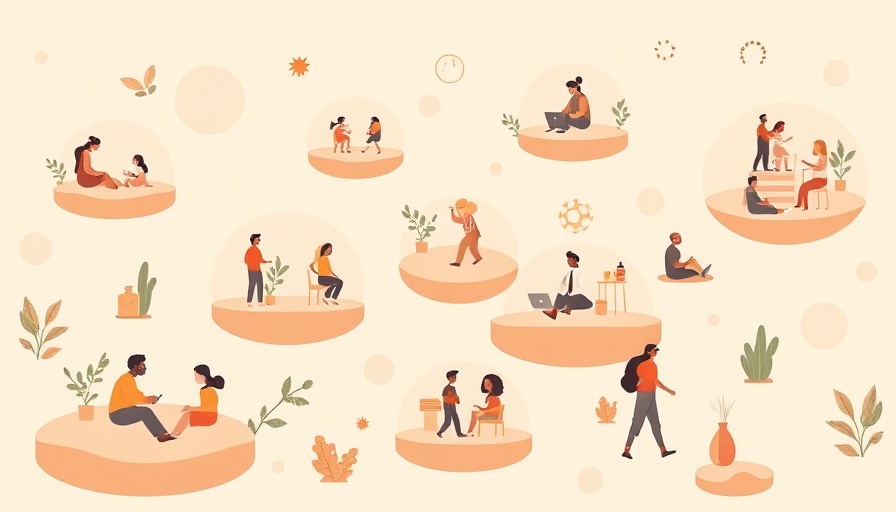
The Lasting Impact of COVID-19 on Everyday Life
As we reflect five years after the onset of COVID-19, it’s clear that the pandemic has left a profound imprint on the American psyche, reshaping everything from relationships to career trajectories. In various narratives shared across the nation, the voices of diverse individuals reveal both the struggles and the unexpected silver linings that emerged during this tumultuous period.
Individual Journeys: Stories of Change and Resilience
Take Donna Sintic, a 72-year-old from Santa Monica, California, who acknowledges a dramatic shift in how she now views familial gatherings. She recalls, “It totally changed my perspective on holidays. Suddenly it was okay to eat pizza on the patio—spaced six feet apart—on Thanksgiving.” This is just one example of how COVID-19 prompted many to reflect on their priorities and let go of rigid traditions.
On the other end of the spectrum, Miguel Guzman, a 56-year-old from San Antonio who nearly lost his life to the virus, shares, “The most important thing is being grateful to be alive. I was thinking about my family—how they were going to manage if I didn’t live.” Such perspectives echo across countless Americans, reminding us that the pandemic forced many to confront mortality in ways they had not anticipated.
Wider Trends: Where Do We Stand Today?
According to a recent Pew Research Center study, about 72% of U.S. adults report that the pandemic drove the country apart rather than uniting it. While Donna found a new way to embrace family, others grappled with the social alienation amplified by the pandemic. Asher Steinberg, 33, reveals his ongoing hesitancy in crowded settings and suggests a lingering uncertainty about personal health measures that has remained even as the world seems to return to normal.
Moreover, systemic changes were observed in workplace dynamics. The pandemic sparked a significant rise in remote work, which research indicates has altered employees’ perceptions of work-life balance. Some now prioritize mental wellness and family time over the relentless grind, a trend that could redefine professional expectations in the coming years.
The Emotional Ripple Effects of COVID-19
Throughout these narratives, a common thread is the emotional impact of the pandemic. Many respondents report feelings of isolation and grieving not only the loss of loved ones but also the loss of the social fabric that once held communities together. A stitch of grief now runs through the everyday lives of many, causing a shift in how we connect. Michelle Jaggi of Erie, Pennsylvania, speaks to this experience, emphasizing how the absence of traditional social activities has left hurt feelings in its wake.
As life begins to adapt, it becomes clear that many Americans are still sorting through the trauma of the past years. The psychological implications have been substantial, awaking a collective recognition that life may never revert to the way it was before.
Pandemic Lessons: Insights for Future Preparedness
The echoes of COVID-19 will likely inform how America prepares for future health crises. Insights from this period highlight the importance of solidarity, mental health awareness, and the necessity for robust public health strategies. Studies suggest that there is still room for improvement in communicating public health information, with a large segment of the population expressing confusion regarding current health guidelines. This confusion underscores the need for clearer messaging and cohesive strategies moving forward.
As we nail down lessons learned from this pandemic, there is hope that a greater understanding of communal responsibility and health consciousness can emerge.
Emphasizing Community in Recovery
Finally, while many focus on individual experiences, it’s essential to emphasize the communal strength that can emerge in recovery. The pandemic has encouraged some to rethink their roles within their communities, potentially leading to a spirit of cooperation and collective growth. This renewed sense of purpose may help bridge the gaps that emerged during the pandemic.
As we look ahead, embracing the stories and lessons from the pandemic can guide us toward a more united and resilient society.
To continue fostering a sense of community and support, consider reaching out to a friend or neighbor you haven’t spoken to lately. Check in and see how they are doing; it’s the little connections that can have a big impact.
 Add Row
Add Row  Add
Add 




Write A Comment